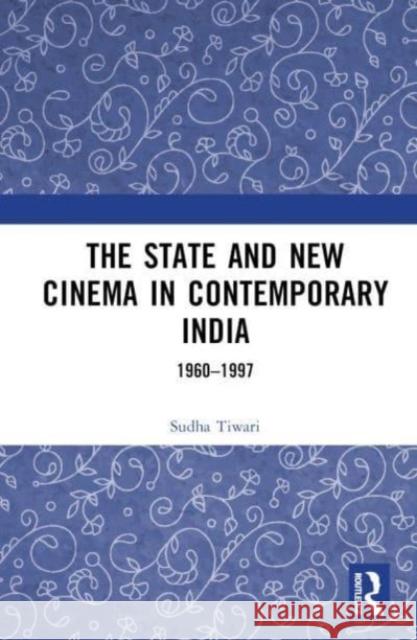The State and New Cinema in Contemporary India » książka



The State and New Cinema in Contemporary India
ISBN-13: 9781032371016 / Twarda / 2023 / 272 str.
The State and New Cinema in Contemporary India
ISBN-13: 9781032371016 / Twarda / 2023 / 272 str.
(netto: 718,58 VAT: 5%)
Najniższa cena z 30 dni: 654,86
ok. 16-18 dni roboczych.
Darmowa dostawa!
This book examines the relationship between the newly independent Indian state and its New Cinema movement. It looks at state formative practices articulating themselves as cultural policy.
“The author presents the story of a chronological development, not losing sight of the importance of facts and individual actors in the process even as she builds her argument on the relationship between policy, industry, and cultural production in independent India. The picture that emerges through the chapters is not only of cinema, or the artistic pursuit of cinema, but of a larger field where the market, political inclinations of the Indian state, and the more complex determinants of culture intersect. This is by far the most thorough study of the Indian New Cinema.” — Moinak Biswas, Professor & Head, Department of Film Studies, Coordinator, The Media Lab, Jadavpur University.
“Dr. Tiwari takes a subject that looks dry as dust, the working of two government run film finance corporations but uses the material to illuminate the linkages to the New Cinema of the mid 1970s on. Even those familiar with many of the sensitive and well-crafted films of the time will be surprised by her findings. In the process, this book opens up new vistas in looking at films, the creative arts of storytelling and narrative at a critical stage of independent India’s journey from the days of the Emergency (1975-77) to the mid-1990s when the process of liberalisation gathered pace. Film finance as a mirror to society and much more than that: a fine monograph at debut.” — Mahesh Ranagarajan, Professor of History and Environmental Studies, Ashoka University, Haryana, India.
“Dr. Tiwari has provided a fascinating institutional history of India’s New Cinema movement. The first book of its kind, it examines the Film Finance Corporation (FFC)/National Film Development Corporation (NFDC) over a period of 50 years. It brings together film history and cultural policy studies to reflect on an important Indian public and intellectual institution. In doing so, this becomes a fine collection of historical research, probing through varied archives and debates, offering us invaluable insights into the landscape of New Cinema across government, bureaucrats, financiers, film makers, technicians, film critics, and those who watched the films. Such original and accomplished scholarship is not only welcomed, it is to be celebrated too.” — Rajinder Dudrah, Professor of Cultural Studies and Creative Industries, Birmingham City University, UK.
“This book is a rigorous, robust, and dexterously researched history of the most powerful film funding bureaucracy in postcolonial India - the National Film Development Corporation. Tiwari assiduously excavates numerous archives to meticulously show the intricate linkages and network between Indian postcolonial state, film industry, filmmakers, journalists, bureaucrats in the making of a complex landscape which gave birth to the influential Indian New Wave. This book adroitly sutures historiography and cultural studies to give us an astute insight hitherto unseen in the discipline of Indian film studies.” — Ashish Avikunthak, Professor of Film Media, University of Rhode Island.
“Sudha Tiwari’s uniqueness is in straddling the difficult-to-access archival materials and the rare (cinema) journals of the period to shed light on the aspirations and critique of cinema surrounding NFDC as a state apparatus, dependent on public money and driven by the “progressive” posture/impulse of the people in power, as well as a space for the intricate intervention of cinema as a sociocultural art form where marginalized voices could be foregrounded. Sudha’s meticulously researched and compelling book sheds light on the challenges of writing institutional histories in the Indian context and the creative possibilities inherent in filling up the lacuna in the material domain through alternative means.” — Swarnavel Eswaran, Associate Professor, Dept. of English and the School of Journalism, Michigan State University.
“A textured, penetrating and streamlined study of an important stage in the evolutionary transformation of the FFC into the NFDC, providing a revealing insight into the NFDC’s synergies with the new emerging Indian postcolonial film landscape.” — Ashvin Devasundaram, Senior Lecturer in World Cinema, School of Languages, Linguistics & Film, Queen Mary University of London.
Introduction 1. Cinema, State, and Scholarship: A Discussion 2. Situating the Desire for a New Cinema (1950s) 3. Formation of Film Finance Corporation: New Cinema gets Institutionalized (1960–74) 4. Whither New Cinema? : Emergency, Disciplining, and Survival through Merger (1975–80) 5. National Film Development Corporation and the Burden of Development on New Cinema (1980s) 6. Economic Reforms, NFDC, and New Cinema: Battle for Existence (1991–97). Conclusion
Sudha Tiwari teaches at the School of Liberal Studies, UPES, Dehradun, India. She has a PhD from the Centre for Historical Studies, Jawaharlal Nehru University, New Delhi, India (2021), MPhil, MA, and BA in History from University of Mumbai. She was a recipient of the Fox International Fellowship program at Yale University (2016–17) and has received a Junior Research Fellowship from Indian Council of Historical Research. Her articles have appeared in Economic and Political Weekly of India, Proceedings of the Indian History Congress, and South Asian Popular Culture. Her research interests include Partition of India, histories of culture, films, institutions, and policy studies in modern and contemporary India.
1997-2026 DolnySlask.com Agencja Internetowa
KrainaKsiazek.PL - Księgarnia Internetowa









